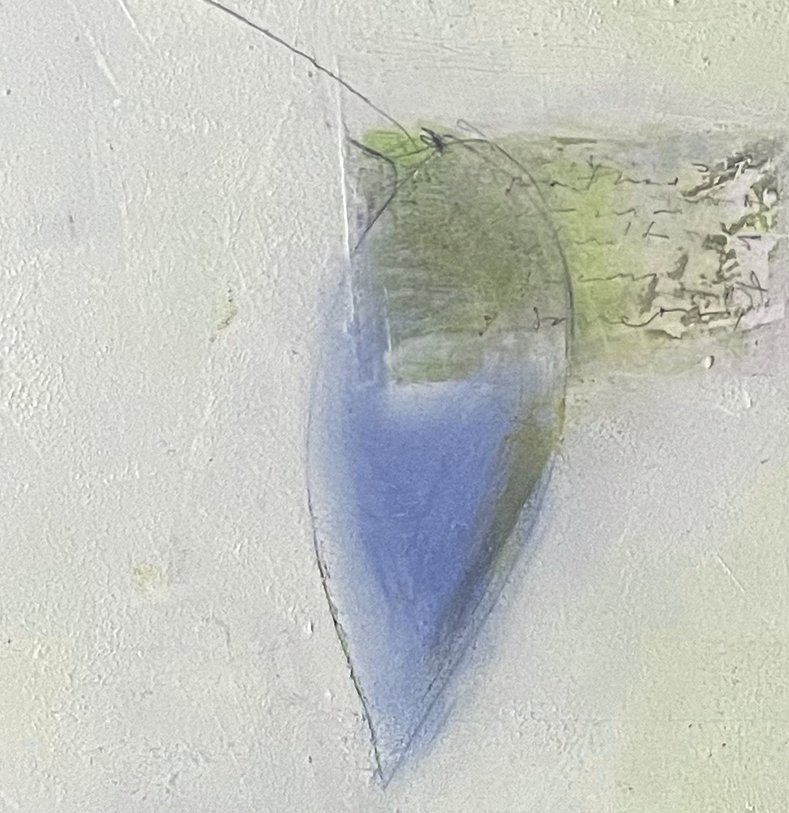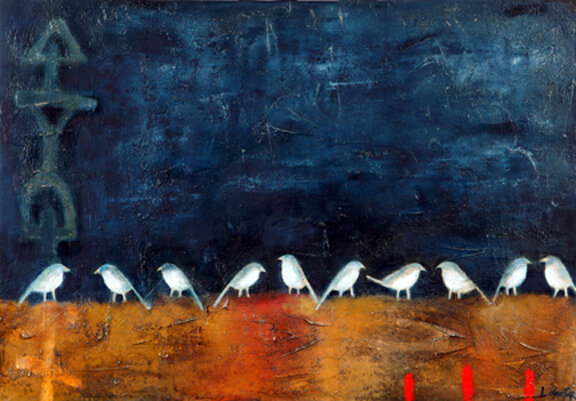
New Exhibition: Winter Seeds Promise
I thought about not posting today, not on this election day in the USA, (my practice being the first Tuesday of the month ), but then I thought what better time to hear Denise Levertov’s poem Concurrence that she wrote during another time of cultural upheaval — the Viet Nam War? What better time to be reminded that while there may be “madmen at the wheel” there is also the timeless faultless blue of a morning glory, or a bluebird, or sky. There is comfort in unexpected outbreaks of blue — like now, three bluebirds checking out the bluebird house — or a poem that takes hold, or returning to the mystery that holds us all on this giant ball spinning on its axis in endless space. There is comfort in the harvest moon that has returned for billions of years without hesitation or concern for our trials. There is possibility in every first sunlight.
Each day’s terror, almost
a form of boredom—madmen
at the wheel and
stepping on the gas and
the brakes no good—
and each day, morning-glories
faultless, blue, blue sometimes
flecked with magenta, each
lit from within with
the first sunlightConcurrence |Denise Levertov

“I heard my whole self saying and singing what I knew: I can.”
This poem by Denise Levertov struck me for the new year. It reminds me that no matter our circumstance, some presence can make itself felt, and this is all the confirmation that is needed to make the world new.
A certain day became a presence to me;
there it was, confronting me—a sky, air, light:
a being. And before it started to descend
from the height of noon, it leaned over
and struck my shoulder as if with
the flat of a sword, granting me
honor and a task. The day's blow
rang out, metallic—or it was I, a bell awakened,
and what I heard was my whole self
saying and singing what it knew: I can.
— Denise Levertov, Variations on a Theme of Rilke (The Book of Hours, Book I, Poem I, Stanza I)
Wherever I find myself in 2024, it is always possible, and even hopeful, to begin again, to feed the unuttered seeds born in darkness. January is a time when thr eventual blossoming of these seeds is nourished by turning inward. There is that phrase in the Levertov poem about being given an honor and a task. Even if I don’t know what this means, I can begin with something that matters. Something that matters meaning simply something that matters to me alone.

Presence and Productivity
What I want to talk about today is how to find a balance between solitude and interaction, and how bringing presence to both cultivates productivity. Being a maker requires both solitude and interaction. Quality solitude awakens your inner life, your muse and your imagination. Meaningful interaction — a conversation with a fellow traveler — fuels creativity. Joseph Campbell said: “We may as well be with those who bring out the best in us.” How you spend your days, and who you spend them with, matters.
A full day of solitude is water for the thirsty maker…on these days, I often take a long time getting out of my pajamas. Breakfast is late too, but before noon. The length of time for dedicated solitude is less important than the quality of solitude. Quality is the renewal, the welcoming of a fresh horizon, that arises naturally from stillness. Yet stillness seems so distant to the restless mind. It’s as if everything is aligned in opposition to having an inner life. There is an aversion to boredom, a craving for stimulation, and a longing for the next shiny object. Let me give you an example:
There was a research study set up to examine our resistance to “doing nothing”. The participants were asked to sit alone in a room, without moving or having access to any devices, for 10 minutes. They were given the option to sit still, or to press a button that would give them an unpleasant electric shock. 25% of the women and 67% of the men chose to shock themselves rather than sit still.
It’s as if we don’t want to allow the presences tapping on our dark and luminous world of possibility, the images that are summoning us, to actually arrive and expand our being.

Once Upon A Time
You can see this any day. It is both time and place at once. It is of transcendent beauty. It is the agent of all transformation. It is the origin of all things. It is so familiar that it is known by all. Yet so familiar it is forgotten and unseen. But even forgotten it is the one essential thing: the dawn.
(Susan Brind Morrow, The Dawning Moon of the Mind: Unlocking the Pyramid Texts)

Leaping Greenly Spirits of Trees
I am not sure what prompted me to sign up for the Tarot Conclave in Philadelphia. My concerned friends asked me some pointed questions. My husband, fairly indignant at my having just touched down from Santa Fe, had some more. I normally travel for the art classes I teach, and they are carefully planned and scheduled well in advance. But, like work with the Tarot, this was intuitive and completely spontaneous. I simply packed my sketchbook and went; not even I knew what to expect.

No Praise, No Blame
William Stafford's philosophy of teaching, "no praise, no blame" is something I aspire to. He felt it is not our job, as teachers, to deal out praise or blame, but rather to create an atmosphere where, in the end, the teacher is envious of the work the students have done. I want to cultivate an environment that is not oriented to what others' think, or what the teacher thinks– but that arises from the inside, brings out surprises, and elicits the best each student has to offer. "I would rather be envious of my students' work than encouraging them." (Wm. Stafford)

The Silver Apples of the Moon
After teaching a class at Ghost Ranch, I was invited to stay in Taos at the Mabel Dodge Luhan Retreat, where I will be teaching next May. I was walking with Marguerite in downtown Taos when we wandered into the Ortenstone Delattre Gallery. Neither of us had ever been there, or ever heard of Pierre Delattre. He was sitting behind his desk and stood up to greet us– shining silver hair, shining eyes. In retrospect, it is like the archetypal stories where the children lose their way and find themselves inside a magic castle or enchanted forest. I was instantly spellbound, and wanted to see everything that was in this gallery.

This Isn't A Contest
There is a way to come back to ourselves, to create with gusto, when the world can feel like a giant steam roller of information and competition. This weekend a couple of our friends, who have converted a room in their home into a gallery, invited about a dozen of us to come over and see the exhibit, drink some wine, eat fresh baked bread, and have a conversation. It wasn't about evaluating the work, dealing out praise or blame, or selling. It was about ideas and friendship, creativity and play. I made discoveries about other artists that enlivened me. Our friends even re-designed the labels for the wine they served:

"You Can't Discover the Product Until You're Making It" –Stephen Colbert
There was an article this week in the NY Times on Stephen Colbert's new role as the host of "The Late Show". In spite of the fact that he has been preparing all summer, he said: You can't discover the product until you're making it. This is the one of the characteristics of art, whether it is music, painting, teaching or theatre– if you already know what you are going to do, it loses vitality, and the delight of surprise. It is the paradox of being immersed in preparedness and open to the moment. This is both terrifying and a relief– for when we can forget about ourselves and the thing we are making, we become a vessel for creation– which is always more than we could imagine.

Are You Guided by Aim or Fate?
I love returning to a book or a poem that is well written, as there is always something new that emerges, or something I have read before, but now I understand more deeply. There is a scene from Tolkein's The Lord of the Rings, when an arrow, against all odds, hits its mark. Tolkien says: It was guided by aim or fate. What an image! We have all had the experience of something coming to pass where there seemed to be a force outside the realm of cause and effect at work. How much of our work results from our aim, our will– and how much from something that we cannot quite pin down?
